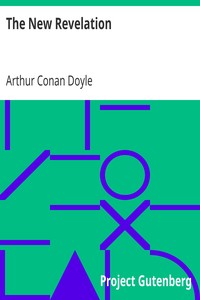The New Revelation by Arthur Conan Doyle
"The New Revelation" by Arthur Conan Doyle is a philosophical text written during the early 20th century. The book explores the intersection of science and spirituality, particularly focusing on psychical research and the evidence of life after death. Doyle, known for his creation of Sherlock Holmes, uses his platform to advocate for the serious consideration of spiritualism and the potential of spirit communication. The opening of the work lays the groundwork for
Doyle's exploration of spiritual topics and his personal journey transitioning from a skeptic to a believer. He recounts his initial disbelief in spiritualism, shaped by his medical background that led him to view death as the end of individuality. Through various experiences, including encounters with séances and discussions with notable figures who believed in spirit survival, he begins to reassess his views. Notably, he shares the insights he has gained from both personal experiences and the findings of the Psychical Research Society. The text provides a glimpse into Doyle's thorough examination of spiritual phenomena, characterized by a desire to understand and validate the claims of spiritual communication, while also addressing the skepticism surrounding the subject. (This is an automatically generated summary.)
Read or download for free
| How to read | Url | Size | |||
|---|---|---|---|---|---|
| Read now! | https://www.gutenberg.org/ebooks/1638.html.images | 144 kB | |||
| EPUB3 (E-readers incl. Send-to-Kindle) | https://www.gutenberg.org/ebooks/1638.epub3.images | 125 kB | |||
| EPUB (older E-readers) | https://www.gutenberg.org/ebooks/1638.epub.images | 127 kB | |||
| EPUB (no images, older E-readers) | https://www.gutenberg.org/ebooks/1638.epub.noimages | 114 kB | |||
| Kindle | https://www.gutenberg.org/ebooks/1638.kf8.images | 243 kB | |||
| older Kindles | https://www.gutenberg.org/ebooks/1638.kindle.images | 233 kB | |||
| Plain Text UTF-8 | https://www.gutenberg.org/ebooks/1638.txt.utf-8 | 132 kB | |||
| Download HTML (zip) | https://www.gutenberg.org/cache/epub/1638/pg1638-h.zip | 125 kB | |||
| There may be more files related to this item. | |||||
Similar Books
About this eBook
| Author | Doyle, Arthur Conan, 1859-1930 |
|---|---|
| Title | The New Revelation |
| Credits | Produced by Charles Keller. HTML version by Al Haines. |
| Reading Level | Reading ease score: 63.3 (8th & 9th grade). Neither easy nor difficult to read. |
| Language | English |
| LoC Class | BF: Philosophy, Psychology, Religion: Psychology, Philosophy, Psychoanalysis |
| Subject | Spiritualism |
| Category | Text |
| EBook-No. | 1638 |
| Release Date | Feb 1, 1999 |
| Most Recently Updated | Dec 31, 2020 |
| Copyright Status | Public domain in the USA. |
| Downloads | 332 downloads in the last 30 days. |
| Project Gutenberg eBooks are always free! | |

